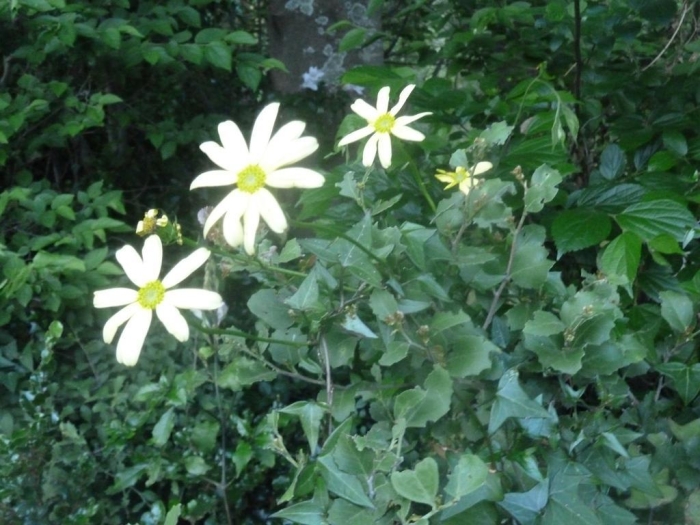Natal Ivy
(Senecio macroglossus)
Natal Ivy (Senecio macroglossus)
/
/

© M Kriek
CC BY-SA 4.0
Image By:
© M Kriek
Recorded By:
Copyright:
CC BY-SA 4.0
Copyright Notice:
Photo by: © M Kriek | License Type: CC BY-SA 4.0 | License URL: http://creativecommons.org/licenses/by-sa/4.0/ | Uploader: mkriek | Publisher: iNaturalist |
























Estimated Native Range
Summary
Senecio macroglossus, commonly known as Natal ivy or wax ivy, is an evergreen vine native to the forest margins and scrub areas of southern Africa, including Zimbabwe, Mozambique, and eastern South Africa. It can reach up to 10 feet in height and is characterized by its waxy, ivy-like, triangular leaves that mimic those of true ivies (Hedera species). Natal ivy blooms in summer, producing bright yellow, daisy-like flowers that are moderately showy and attract pollinators. The foliage remains attractive throughout the year.
Natal ivy is valued for its ease of maintenance and adaptability, making it a popular choice for indoor cultivation in temperate regions. It thrives in hanging baskets or as a trailing plant on shelves and indoor trellises. The ’Variegatus’ cultivar is particularly esteemed for its variegated leaves with cream-colored margins and has received the Royal Horticultural Society’s Award of Garden Merit. In cultivation, Natal ivy prefers bright, indirect light and well-draining soil. It requires moderate watering, allowing the soil to dry out slightly between waterings. Overwatering can lead to root rot, so proper drainage is essential. While generally pest-resistant, it can occasionally suffer from mealybugs and aphids.CC BY-SA 4.0
Natal ivy is valued for its ease of maintenance and adaptability, making it a popular choice for indoor cultivation in temperate regions. It thrives in hanging baskets or as a trailing plant on shelves and indoor trellises. The ’Variegatus’ cultivar is particularly esteemed for its variegated leaves with cream-colored margins and has received the Royal Horticultural Society’s Award of Garden Merit. In cultivation, Natal ivy prefers bright, indirect light and well-draining soil. It requires moderate watering, allowing the soil to dry out slightly between waterings. Overwatering can lead to root rot, so proper drainage is essential. While generally pest-resistant, it can occasionally suffer from mealybugs and aphids.CC BY-SA 4.0
Plant Description
- Plant Type: Vine
- Height: 1-3 feet
- Width: 2-3 feet
- Growth Rate: Moderate
- Flower Color: Yellow
- Flowering Season: Summer
- Leaf Retention: Evergreen
Growth Requirements
- Sun: Part Shade, Full Shade
- Water: Medium
- Drainage: Medium, Fast
Common Uses
Border Plant, Groundcover, Low Maintenance, Potted Plant, Street Planting
Natural Habitat
Forest margins and scrub areas of southern Africa
Other Names
Common Names: Natal Ivy, Flowering Ivy, Waxvine, Wax Ivy
Scientific Names: , Senecio macroglossus,
GBIF Accepted Name: